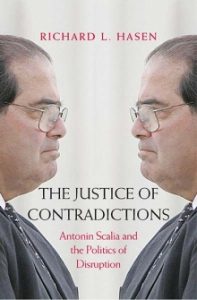Once again it has been a busy year for the Election Law Blog and 2018 promises some big news as well in the area of voting rights, campaign finance, filibuster reform/political polarization and other topics.
I am very much looking forward to March 2018, when my new book, The Justice of Contradictions: Antonin Scalia and the Politics of Disruption will be released by Yale University Press. (You can preorder at Amazon, though the Kindle and audiobook links are not yet up). I’ll be doing some talks connected with the book, and I’ll be announcing those dates and locations in January.
i wish all my readers a safe, healthy and happy 2018.
Below the fold you’ll find a list of books, articles, and opeds that I’ve published (or that were released in draft) in 2017. Thanks for reading!
